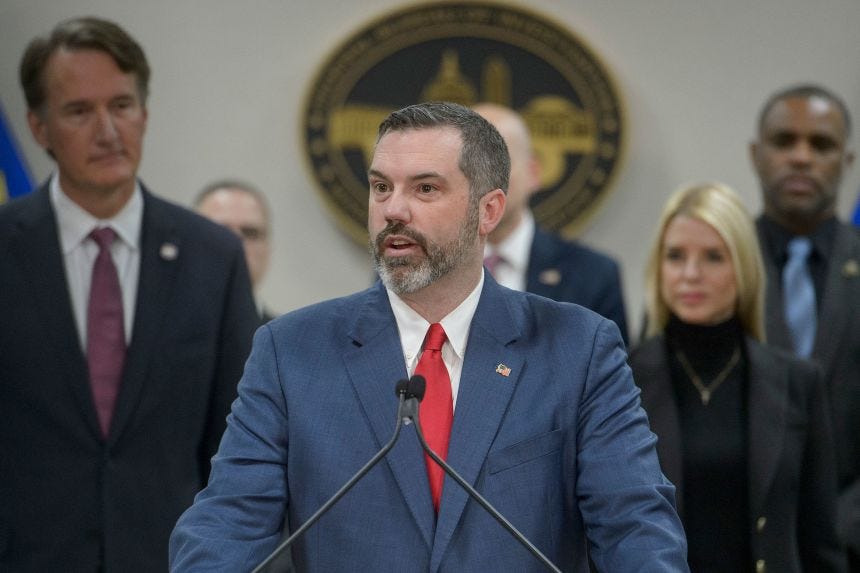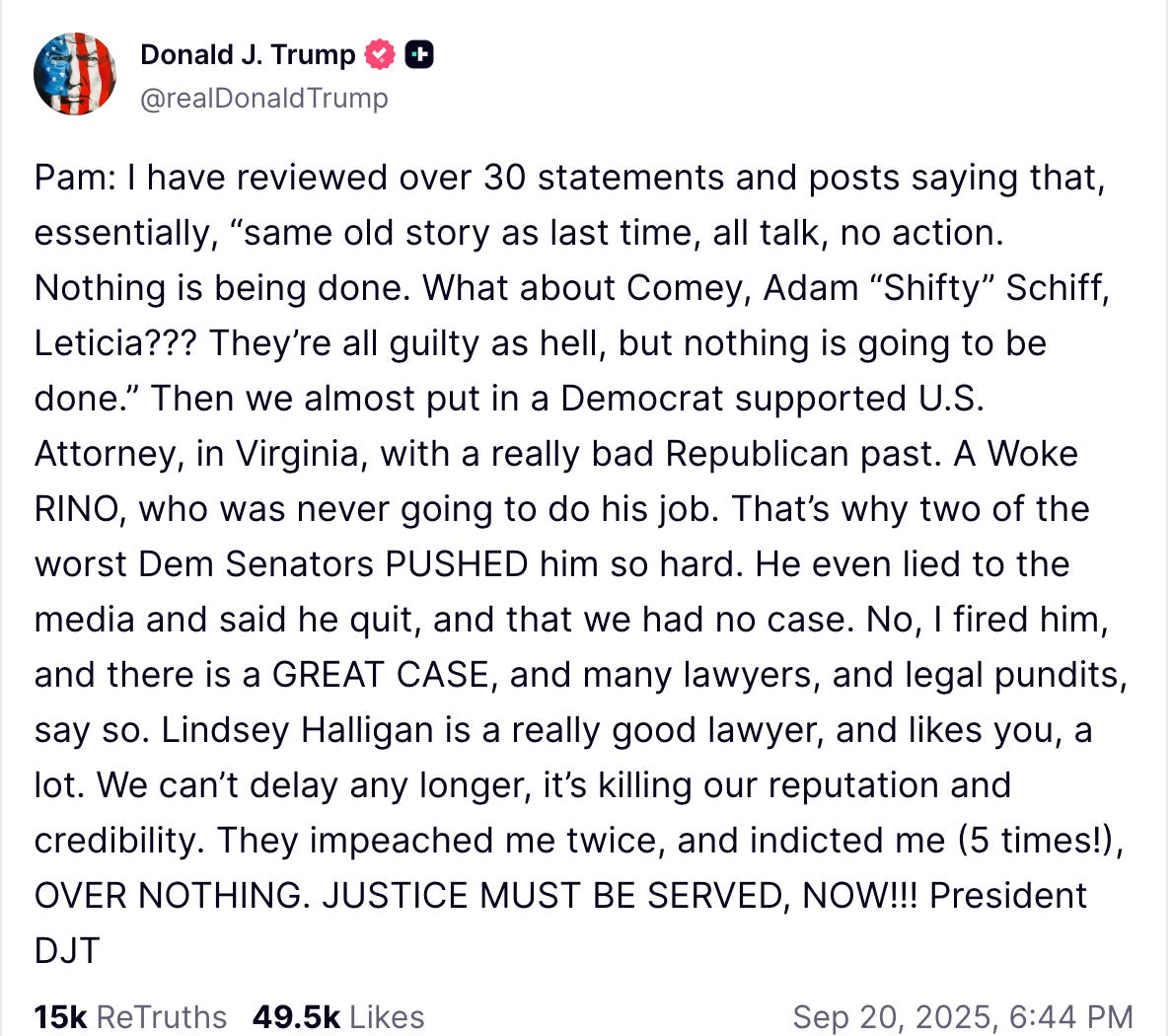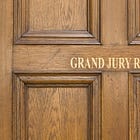Trump Escalates His Weaponization of the Justice Department
Punish your enemies, protect your friends
Ever since his first campaign and the chants of “Lock her up,” President Trump has made no secret of his willingness to use the criminal justice system as a political weapon. In his first term such plans were often blocked by career professionals at the Justice Department and even his own Attorney General. But in his second term, with his loyalists and personal attorneys filling top Justice Department positions, he faces far fewer obstacles.
On his first day in office he pardoned the January 6 Capitol rioters, sweeping aside the judgments of the criminal justice system in hundreds of cases in order to reward his supporters. His Justice Department ordered prosecutors to drop the corruption case against New York City mayor Eric Adams in exchange for Adams’ help enforcing Trump’s immigration crackdown. His attorney general Pam Bondi, who apparently skipped constitutional law class during law school, threatened to “go after” those who engage in “hate speech” - presumably defined as saying things the president doesn’t like. Bondi also created a “strike force” at DOJ to investigate Trump’s ridiculous allegation that former president Obama engaged in “treason” by trying to rig the 2016 election.
Now Trump has significantly escalated his weaponization of the Justice Department. Over the weekend he publicly demanded that Bondi expedite criminal prosecutions of Trump political foes NY Attorney General Letitia James, Senator Adam Schiff, and former FBI director James Comey. He forced out the respected career prosecutor heading the U.S. Attorney’s Office for the Eastern District of Virginia for concluding the evidence to prosecute James and Comey was lacking. Trump then installed as the interim U.S. Attorney one of his personal lawyers who has no prosecution experience but who clearly knows what the boss wants.
In a separate development, MSNBC broke the news that prior to Trump’s election in 2024 his current “border czar” Tom Homan was caught on tape accepting $50,000 in cash from FBI undercover agents posing as businessmen. In exchange Homan allegedly agreed to help them obtain government contracts after he became part of the new Trump administration. Prosecutors and the FBI wanted to pursue the investigation after Trump was elected, but his Justice Department shut it down.
Trump sees the criminal justice system as a tool he can use to punish his enemies and protect his friends. He does not even bother trying to conceal that fact — he trumpets it. It’s another way for him to intimidate those who would oppose him and reward those willing to do his bidding. It’s right out of the authoritarian playbook, and it’s scary and dangerous stuff.
Punish Your Enemies
Trump has made no secret of his desire to see his political foes prosecuted. He has particularly singled out James, who brought a massive civil fraud case against Trump and his company; Schiff, who led Trump’s first impeachment and later served on the House January 6 Committee; and Comey, the former FBI Director Trump fired and whom he blames for what Trump calls the “Russia Hoax.”
The former acting U.S. Attorney for the Eastern District of Virginia, Erik Siebert, is a respected career prosecutor. He was appointed to the position by Trump himself and was awaiting Senate confirmation. Despite pressure from the White House to prosecute Trump’s enemies, Siebert recently concluded there was not sufficient evidence to bring criminal charges against Letitia James or Jim Comey. This appropriate exercise of prosecutorial discretion was too much for Trump, who said of Siebert at a press conference, “I want him out.” Siebert resigned later that day.
Erik Siebert, former Acting U.S. Attorney for the Eastern District of Virginia (Ron Lamkey/AP)
On Saturday Trump unleashed his frustrations on Attorney General Pam Bondi in an astounding and unhinged social media rant that appears it may have originally been intended to be a private message to her:
As his post notes, Trump has appointed Lindsey Halligan to take Siebert’s place on an interim basis. Halligan is a former insurance claims lawyer in Florida who served as one of Trump’s personal attorneys during his Florida prosecution. Her most recent position was as a White House aide in charge of reviewing Smithsonian museums to scrub them of “woke” materials. She has no experience as a federal prosecutor. Presumably her primary qualification for the job is her willingness to do whatever Trump wants her to do.
One of the many extraordinary things about Trump’s post is the final lines, where he admits the reason he wants prosecutors to pursue his political enemies is that they impeached and indicted him. It’s all about personal grievance and retribution - never mind whether the facts and law actually support a prosecution (although he also opines, of course, that they are “guilty as hell”). Openly admitting that this is why he pushed Siebert out and replaced him with Halligan demonstrates that Trump has no clue about the proper role of the Justice Department – or that he just doesn’t care.
Firing career prosecutors who won’t do your political bidding and replacing them with people who will is an extraordinary breach of the historic independence of the Justice Department. As Ruth Marcus recently wrote in The New Yorker, it crosses the “reddest of lines.” For decades in the post-Watergate era, strong institutional norms and guidelines have sought to ensure that the White House is not involved in criminal prosecutions. After Nixon’s abuses the country recognized the extraordinary danger of allowing presidents to unleash the awesome power of the criminal justice system against their political foes.
But if there is one thing we’ve learned about Trump, it’s that he cares little about the norms that guided the country prior to his arrival. He not only tramples those norms but does so loudly and openly, inserting himself into the prosecution process. Instead of allowing criminal investigations to proceed outside of the public eye, he trumpets his demand for indictments and his personal conviction that his targets are guilty of something - it doesn’t really matter what.
It’s hard to convey what a fundamental violation this is of the core tenets of our criminal justice system. Prosecutors pursue criminal investigations based on the facts and the law, without fear or favor, and without regard to politics. For good prosecutors these are not mere platitudes; they become part of your professional DNA, your fundamental guiding principle. No one would claim this principle was always perfectly followed; there are bad prosecutors, and humans are flawed and fall short. But prior to Trump almost no one doubted the fundamental importance of this principle to our government integrity and the rule of law.
The damage Trump is doing to the Justice Department and to the public’s faith in the justice system is incalculable. As I’ve written before, to those of us who worked at DOJ and cherish the ideals for which it used to stand, watching all of this is heartbreaking. For everyone, it should be frightening.
One final point about the Halligan appointment: the Eastern District of Virginia is one of the most important U.S. Attorney’s offices in the country, not some backwater for Trump to fill with his lackeys. The Pentagon and the CIA, as well as numerous other military facilities, are located in that district. The office handles some of the most sensitive and complex national security cases in the nation. Placing that office in the hands of someone with no relevant experience is reckless and threatens our national security. If Trump nominates her for the permanent position, hopefully enough Senators will recognize that and block it - although the Senate’s track record so far when it comes to Trump nominees does not inspire confidence.
Protect Your Friends
On the other side of the coin, we saw another example this week of how Trump is willing to manipulate the justice system to protect political allies. Veteran journalists Carol Leonnig and Ken Dilanian reported at MSNBC that last year the FBI recorded Trump border czar Tom Homan accepting $50,000 in cash from undercover agents posing as businessmen. In return, Homan allegedly promised to help them obtain government contracts once he received an anticipated appointment in the new Trump administration. Reportedly the cash was handed over in a bag from the Cava restaurant chain.
The Public Integrity section at the Justice Department got involved in the case, and prosecutors and agents decided to wait to see if Homan would follow through once he was in the government. But once they were in office, Trump DOJ officials and his FBI director Kash Patel shut down the investigation.
In response to the story, Patel and Deputy Attorney General (and Trump’s personal defense attorney) Todd Blanche said FBI agents and prosecutors had reviewed the investigation and had found “no credible evidence of criminal wrongdoing.” A White House deputy press secretary said the investigation was “blatantly political” with “no evidence of illegal activity,” and was simply another example of the Biden administration targeting Trump officials.
Some analysts and Trump allies are claiming a prosecution would have failed because Homan was not yet a public official at the time, or because there was no clear quid pro quo. It’s true the federal bribery statute requires that the bribe recipient be a public official or at least have been formally nominated. But that’s not necessarily the end of the inquiry. These facts could support a charge of conspiracy to commit bribery: an agreement to perform official acts in the future in exchange for bribes, once the official is appointed. In a conspiracy charge the crime is the agreement to engage in some future criminal activity. It doesn’t matter whether the future crime ever actually takes place; the conspiracy crime is the agreement itself.
There was a very similar case that arose as part of the Wedtech scandal during the Reagan administration. Eugene Wallach, a friend of Attorney General Ed Meese, accepted money from Wedtech in exchange for his promise that Wallach would advocate for Wedtech before the government after Meese appointed him to a senior Justice Department position. That would violate 18 U.S.C. 203, a cousin of the federal bribery statute. It turned out Wallach never got the appointment, but his conviction for conspiracy to violate section 203 was upheld by the Second Circuit. Adhering to textbook conspiracy law, the Court held that it didn’t matter whether Wallach actually violated 203 or even whether it was ultimately possible for him to do so. The conspiracy charge requires only the agreement to commit a crime in the future and at least one overt act taken in furtherance of that agreement.
I’m not saying the case would necessarily be a slam-dunk. Much would depend on exactly what Homan said and what he agreed to do in exchange for the cash. There could be issues under the Supreme Court’s McDonnell decision about whether he agreed to perform “official acts” within the meaning of the bribery statute, and that could be further complicated by the fact that it was unclear what his government position would be. There could be a legal defense to conspiracy if only Homan and the undercover agent were involved, because then there is no true agreement. All of that may be why prosecutors chose to wait until after Homan was actually appointed rather than charging him right away, so they could conduct additional investigation and potentially strengthen the case.
But - “no evidence of illegal activity?” Give me a break. Legitimate business transactions are not typically conducted by exchanging fast food bags full of tens of thousands in cash. That fact alone is significant evidence of corrupt intent. It certainly would be more than enough to justify further investigation. In the ordinary course of an investigation like this, once Homan was in office you’d have the undercover officer take another run at him to see if he’s willing to follow through. Instead the Trump DOJ chose to sweep it all under the rug – and someone involved in the prosecution apparently was upset enough to go to the press.
On Monday the White House took a new tack and denied that Homan even took the money. But reportedly the exchange is on tape. If the White House is telling the truth, it would be easy to prove it by releasing the tapes, as Congressional Democrats are now demanding. I won’t be holding my breath.
Still Some Guardrails
Even if Halligan ends up trying to indict the cases that Trump is demanding, she will face some hurdles. Grand juries have been refusing to indict frivolous or trivial cases brought by Trump’s DOJ. That could happen here as well.
Halligan could also face another mass resignation event like the “Thursday Afternoon Massacre” in New York, where a number of prosecutors resigned rather than agree to dismiss the case against New York Mayor Eric Adams. Indicting a case when there is insufficient evidence of criminal conduct violates a prosecutor’s ethical obligations. Individual prosecutors must consider their oaths of office and even the risk to their own bar licenses. With no prosecution experience Halligan is not going to know where the grand jury room is, much less how to obtain an indictment. She will need help. We could see a number of the career people at the Eastern District follow Siebert’s example and resign rather than agree to seek such indictments.
Even if the cases are indicted, they will have zero credibility with the court or the public after this series of events. The defense will move to dismiss the charges based on legal doctrines such as vindictive or selective prosecution, and Trump’s own social media posts will be Exhibit 1. Even if the cases manage to get to trial, proving guilt beyond a reasonable doubt to a unanimous jury will undoubtedly be extremely difficult. The trial jury always stands as a final check against the abuse of prosecutorial power.
But all of that is not much comfort to the person who is wrongly investigated or indicted. They still suffer reputational and emotional damage and are forced to spend significant time and money defending themselves. Simply being subject to investigation and indictment is a tremendous harm – which of course is precisely the point. As one person close to Trump reportedly and remarkably said, even if they can’t secure indictments or convictions “the process is the punishment.”
I always tell my students that the ability to launch a grand jury investigation is the ability to ruin someone’s life. Prosecutors are entrusted with awesome power that must be exercised responsibly. Unfortunately we are now seeing what that power can do in the hands of a president willing to wield it as a political weapon.





A corollary to whether Homan kept the money---if it's proven that he got the money then the next question is if he paid taxes on it.
So did Homan keep the FBI's money. Doesn't seem a good use of taxpayer dollars...maybe waste, fraud and abuse? I'm outraged by the medical end of things-seeing DJT fumbling the pronunciation of acetaminophen as they gave idiotic medical advice was like the unqualified people misusing the DOJ. Painful and dangerous.